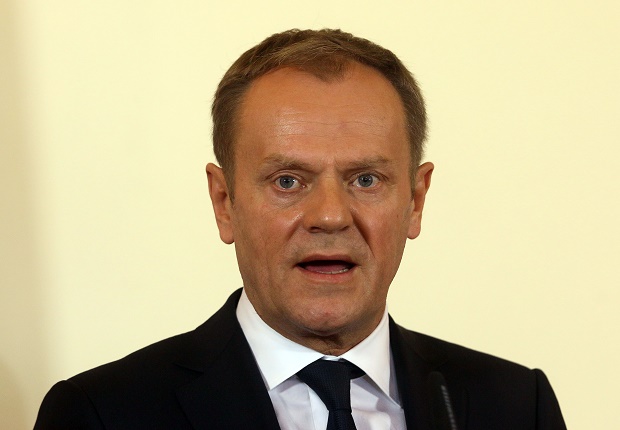EU’s Tusk in Greece as 700M euro migrant aid plan launched

European Council President Donald Tusk addresses the media during a news conference after talks with Austrian Chancellor Werner Faymann at the federal chancellery in Vienna, Austria, Tuesday, March 1, 2016. AP Photo
BRUSSELS, Belgium—EU President Donald Tusk was due to arrive in Athens Thursday for talks on the migrant crisis, after the bloc proposed 700 million euros in emergency aid for Greece and other states to help them manage the influx at their borders.
Tusk’s visit forms part of a regional tour which has already taken in Slovenia and will on Friday see him meet Turkish President Recep Tayyip Erdogan in Istanbul, ahead of a migration-focused summit in Brussels on Monday.
The proposed emergency fund would mark a departure for the 28-member bloc, as it begins to tackle migration within its borders like humanitarian disasters in developing countries.
READ: EU to give emergency aid to help Greece cope with migrants
The United Nations has warned of a looming humanitarian crisis as thousands of people remained stuck in miserable winter conditions on the Greece-Macedonia border after Balkans states and Austria capped the numbers arriving.
Article continues after this advertisementGreece has been the main point of entry for the 1.13 million migrants who have arrived since the start of 2015 in the European Union, which has been divided and weakened by its biggest migration crisis since World War II.
Article continues after this advertisement“No time can be lost in deploying all means possible to prevent humanitarian suffering within our own borders,” EU Humanitarian Aid Commissioner Christos Stylianides said Wednesday, adding that much of the help would go to Greece.
The funds would be allocated over three years, with 300 million euros ($325 million) in 2016, and 200 million euros in each of the following years under the plan, which must be approved by a majority of member states and the European Parliament.
Athens has asked for around 480 million euros ($520 million) to help shelter 100,000 refugees.
READ: France razes migrant camp as Greece seeks EU aid
Macedonia border misery
The crisis is particularly acute at the Greek border crossing of Idomeni where more than 10,000 are stuck after Balkan states including neighbouring Macedonia imposed tighter controls.
Non-EU Macedonia on Wednesday allowed some 250 Syrian and Iraqi refugees to cross, the first group since dawn on Monday when the frontier was closed.
Bleak scenes played out with refugees in mud-soaked fields fighting over food distributed from the back of a van, as aid agencies reported a lack of food and tents, and warned that the wintry weather was taking a toll on people’s health.
“We know (the border) is closed, but what will happen? There isn’t any other way. We must go here and wait,” said Mouiiaed Saker, a Syrian.
In the French port of Calais, demolition workers razed makeshift shelters in the so-called Jungle migrant camp for the third day running under the close watch of dozens of police officers equipped with water cannon.
The camp is a magnet for people hoping to reach Britain and many have refused to leave, although there has been no repeat of the violent clashes that erupted on Monday.
An annual Franco-British summit was also due to take place on Thursday, where France was expected to ask for more British aid to tackle the Calais migrant crisis, diplomats said.
‘Tougher measures needed’
But the apparent show of European solidarity with the emergency fund for Greece and others masks growing criticism of countries that have capped the number of migrants they are willing to let in.
European leaders are divided ahead of two summits this month on the migration crisis, with German Chancellor Angela Merkel saying that debt-hit Greece must not be allowed to plunge into “chaos.”
The crisis has also raised fears for the EU’s Schengen passport-free zone as more states bring back border controls.
Tusk on Wednesday defended the use of barbed-wire fences against migrants, saying that securing the Schengen area’s outer borders was a “pre-condition” to solving the refugee crisis.
“I’m afraid that sometimes you need tougher measures if you, we want really to apply Schengen. Sorry but this is the reality,” Tusk said during his visit to Slovenia.
After meeting Tusk in Skopje, Macedonian President Gjorge Ivanov said he did not want the migrant burden to fall to Greece alone, but warned his country would not pick up the bill for “unilateral solutions.”
The EU and Turkey will hold a crucial summit in Brussels on March 7 to discuss a faltering deal they signed in November under which Ankara agreed to limit the flow of migrants.
So far, more than 131,000 migrants have crossed the Mediterranean to reach Europe this year, UN figures show—more than the total number for the first five months of 2015. Last year, a million landed on Europe’s shores.